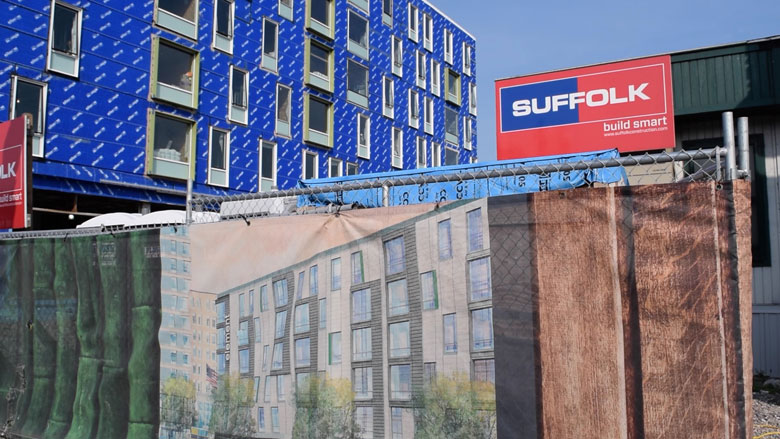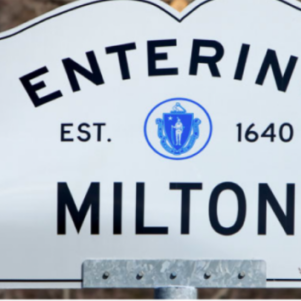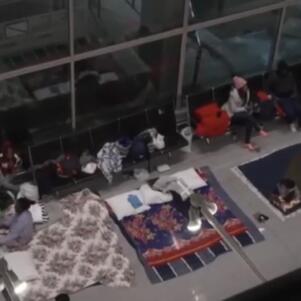Residents, developers, BRA work to both preserve and grow Southie
By Lori Brannigan Kelly | March 31, 2016, 6:54 EDT
 A Suffolk construction site in South Boston. (NewBostonPost photo by Beth Treffeisen)
A Suffolk construction site in South Boston. (NewBostonPost photo by Beth Treffeisen) Home prices are skyrocketing in South Boston, almost doubling in less than 15 years. What has been a boon for developers, though, has been cause for concern for long-time residents, who fear for the loss of the town as they once knew it.
According to a report in South Boston Online earlier this year, “the median sales price of a South Boston property in 2015 was $599,000, according to The Warren Group. In 2002, the median price was $300,000…. “(o)f those properties sold in 2015, 709 were condominiums and 77 were one-family residences.”
A huge demographic shift – the influx of singles, empty-nesters and young millennials without children – combined with the rising cost of housing has, according to many, resulted in a South Boston that has priced middle income people out of the market and is no longer family friendly. The unchecked rush toward urban expansion, say many long-time residents, has occurred without a sensible plan and adequate attention to transportation, parking, density and infrastructure issues.
“There’s no balance. It’s all about development. But what about the people who have been here 50 years?” asked Joanne Morris McDevitt, a lifelong resident. “We don’t have a master plan for South Boston, and we’ve asked for it. Nobody’s looked at the big picture and asked ‘What do you want South Boston to look like?’”
A core issue for McDevitt, who has served as president of the City Point Neighborhood Association since its inception in 2009, is maintaining the integrity of historical neighborhoods and examining why people come to South Boston in the first place. McDevitt wants to make sure that the generations who grew up in Southie – and the structures that housed them – are protected.
A staunch advocate for the preservation of South Boston’s cultural icons, McDevitt said her proudest accomplishment was working with the Association and abutters to secure preservation landmark status for the 1867 James Collins Mansion, a historical home located at 928 East Broadway.
The story of the Collins Mansion underscores McDevitt’s passion. In 2012, developer Rocco Skippa purchased the Collins house in City Point for $2,200,000. Initially, Skippa advanced plans to demolish the 19th century structure and replace it with condominiums. A public outcry ensued. After countless city meetings and discussions, the house was, essentially, preserved. Under the ownership of new developer KEMS Corporation, three-story additions were added to each side of the mansion, and the interior was renovated into nine condos.
“We try to work with what we have to preserve historical sections of South Boston so they are not ruined or jeopardized,” said McDevitt.
Mark McGonagle, Community Affairs Liaison for the Boston Redevelopment Authority (BRA), admits that South Boston is in need of strategies and resources to address surging residential development, rising population, transportation, parking, industrial growth and pressing zoning issues.
“Folks are right,” said McGonagle. “There hasn’t been a master plan. We’re working on that now.”
He said that several years ago the South Boston Civic Association asked to meet with the BRA about big-picture planning. The first meeting took place in February 2014, two months into the new administration of Mayor Mary Walsh.
According to all sides, the discussions were long overdue.
“In my opinion,” said McGonagle, “the zoning code written for South Boston 50 years ago was insufficient for that time.” The BRA, he said, is committed to working collaboratively with residents and allocating funds to establish dimensional regulations and zoning which reflects and preserves Southie’s historical character. The BRA, said McGonagle, wants to promote an “economically thriving neighborhood that adjusts to a growing city, but still maintains its character, its fabric.”
Two BRA planning initiatives are currently in the works: DOT Avenue, which looks at the underutilized industrial parcels between Andrew Square and Broadway Station, and a South Boston Zoning Initiative.
The initiatives will still allow development in Southie.
Dave Winick, 35, has lived in South Boston since 2006. It was also in 2006 that he and partner Dave Matteo opened Cedarwood Development, a Boston-based real estate development firm that specializes in the planning, development and construction management of both residential and commercial projects. Currently, according to Winick, Cedarwood has seven projects under construction in South Boston – 55 condo units with one restaurant and two commercial spaces. Another five projects and 60 units are in the planning stages.
One of Cedarwood’s current projects is the development of 11 Dorchester Street, slated for completion on Sept. 1, 2016. The unit at 11 Dorchester is comprised of 30 residential units with a restaurant on the first floor, and underground parking for 46 cars.
Winick acknowledges the reluctance toward urban renewal expressed by many South Boston residents. “We are presenting change, and change isn’t always perceived as good,” said Winick. “We try to present our development proposals and we try to be reasonable. We really try to work with people as far as height, density, parking spots and the overall look and design of a building. In an effort to collaborate, we negotiate so both parties can win.”
“South Boston now has become a destination. With construction comes growth and a new, invigorated people to the area,” said Winick. “People who have been in Southie a long time should be flattered that this is such a hotbed for others who want to come in here.”
Lori Brannigan Kelly is a freelance writer in South Boston. She can be reached at [email protected].
NBPUrban











